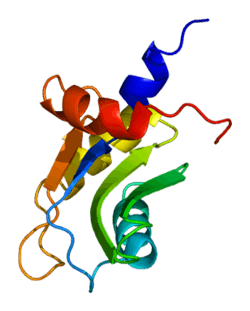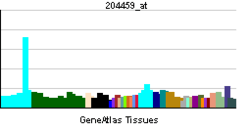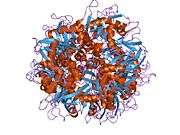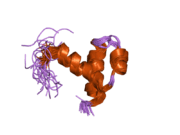CSTF2
| View/Edit Human | View/Edit Mouse |
Cleavage stimulation factor 64 kDa subunit is a protein that in humans is encoded by the CSTF2 gene.[3][4]
This gene encodes a nuclear protein with an RRM (RNA recognition motif) domain. The protein is a member of the cleavage stimulation factor (CSTF) complex that is involved in the 3' end cleavage and polyadenylation of pre-mRNAs. Specifically, this protein binds GU-rich elements within the 3'-untranslated region of mRNAs.[4]
Interactions
CSTF2 has been shown to interact with CSTF3,[5] SUB1,[6] SYMPK,[5] BARD1[7][8] and BRCA1.[7][8]
References
- ↑ "Human PubMed Reference:".
- ↑ "Mouse PubMed Reference:".
- ↑ Takagaki Y, MacDonald CC, Shenk T, Manley JL (March 1992). "The human 64-kDa polyadenylylation factor contains a ribonucleoprotein-type RNA binding domain and unusual auxiliary motifs". Proc Natl Acad Sci U S A. 89 (4): 1403–7. doi:10.1073/pnas.89.4.1403. PMC 48459
 . PMID 1741396.
. PMID 1741396. - 1 2 "Entrez Gene: CSTF2 cleavage stimulation factor, 3' pre-RNA, subunit 2, 64kDa".
- 1 2 Takagaki, Y; Manley J L (March 2000). "Complex protein interactions within the human polyadenylation machinery identify a novel component". Mol. Cell. Biol. UNITED STATES. 20 (5): 1515–25. doi:10.1128/MCB.20.5.1515-1525.2000. ISSN 0270-7306. PMC 85326
 . PMID 10669729.
. PMID 10669729. - ↑ Calvo, O; Manley J L (May 2001). "Evolutionarily conserved interaction between CstF-64 and PC4 links transcription, polyadenylation, and termination". Mol. Cell. United States. 7 (5): 1013–23. doi:10.1016/S1097-2765(01)00236-2. ISSN 1097-2765. PMID 11389848.
- 1 2 Kleiman, F E; Manley J L (March 2001). "The BARD1-CstF-50 interaction links mRNA 3' end formation to DNA damage and tumor suppression". Cell. United States. 104 (5): 743–53. doi:10.1016/S0092-8674(01)00270-7. ISSN 0092-8674. PMID 11257228.
- 1 2 Kleiman, F E; Manley J L (September 1999). "Functional interaction of BRCA1-associated BARD1 with polyadenylation factor CstF-50". Science. UNITED STATES. 285 (5433): 1576–9. doi:10.1126/science.285.5433.1576. ISSN 0036-8075. PMID 10477523.
Further reading
- Takagaki Y, Manley JL (1992). "A human polyadenylation factor is a G protein beta-subunit homologue.". J. Biol. Chem. 267 (33): 23471–4. PMID 1358884.
- Murthy KG, Manley JL (1995). "The 160-kD subunit of human cleavage-polyadenylation specificity factor coordinates pre-mRNA 3'-end formation.". Genes Dev. 9 (21): 2672–83. doi:10.1101/gad.9.21.2672. PMID 7590244.
- Takagaki Y, Manley JL (1994). "A polyadenylation factor subunit is the human homologue of the Drosophila suppressor of forked protein.". Nature. 372 (6505): 471–4. doi:10.1038/372471a0. PMID 7984242.
- Rüegsegger U, Beyer K, Keller W (1996). "Purification and characterization of human cleavage factor Im involved in the 3' end processing of messenger RNA precursors.". J. Biol. Chem. 271 (11): 6107–13. doi:10.1074/jbc.271.11.6107. PMID 8626397.
- Schul W, Groenhout B, Koberna K, et al. (1996). "The RNA 3' cleavage factors CstF 64 kDa and CPSF 100 kDa are concentrated in nuclear domains closely associated with coiled bodies and newly synthesized RNA.". EMBO J. 15 (11): 2883–92. PMC 450226
 . PMID 8654386.
. PMID 8654386. - Takagaki Y, Seipelt RL, Peterson ML, Manley JL (1997). "The polyadenylation factor CstF-64 regulates alternative processing of IgM heavy chain pre-mRNA during B cell differentiation.". Cell. 87 (5): 941–52. doi:10.1016/S0092-8674(00)82000-0. PMID 8945520.
- Takagaki Y, Manley JL (1997). "RNA recognition by the human polyadenylation factor CstF.". Mol. Cell. Biol. 17 (7): 3907–14. PMC 232243
 . PMID 9199325.
. PMID 9199325. - Martincic K, Campbell R, Edwalds-Gilbert G, et al. (1998). "Increase in the 64-kDa subunit of the polyadenylation/cleavage stimulatory factor during the G0 to S phase transition.". Proc. Natl. Acad. Sci. U.S.A. 95 (19): 11095–100. doi:10.1073/pnas.95.19.11095. PMC 21601
 . PMID 9736695.
. PMID 9736695. - Takagaki Y, Manley JL (1999). "Levels of polyadenylation factor CstF-64 control IgM heavy chain mRNA accumulation and other events associated with B cell differentiation.". Mol. Cell. 2 (6): 761–71. doi:10.1016/S1097-2765(00)80291-9. PMID 9885564.
- Kleiman FE, Manley JL (1999). "Functional interaction of BRCA1-associated BARD1 with polyadenylation factor CstF-50.". Science. 285 (5433): 1576–9. doi:10.1126/science.285.5433.1576. PMID 10477523.
- Takagaki Y, Manley JL (2000). "Complex protein interactions within the human polyadenylation machinery identify a novel component.". Mol. Cell. Biol. 20 (5): 1515–25. doi:10.1128/MCB.20.5.1515-1525.2000. PMC 85326
 . PMID 10669729.
. PMID 10669729. - Dass B, McMahon KW, Jenkins NA, et al. (2001). "The gene for a variant form of the polyadenylation protein CstF-64 is on chromosome 19 and is expressed in pachytene spermatocytes in mice.". J. Biol. Chem. 276 (11): 8044–50. doi:10.1074/jbc.M009091200. PMID 11113135.
- Kleiman FE, Manley JL (2001). "The BARD1-CstF-50 interaction links mRNA 3' end formation to DNA damage and tumor suppression.". Cell. 104 (5): 743–53. doi:10.1016/S0092-8674(01)00270-7. PMID 11257228.
- Calvo O, Manley JL (2001). "Evolutionarily conserved interaction between CstF-64 and PC4 links transcription, polyadenylation, and termination.". Mol. Cell. 7 (5): 1013–23. doi:10.1016/S1097-2765(01)00236-2. PMID 11389848.
- Bléoo S, Sun X, Hendzel MJ, et al. (2002). "Association of human DEAD box protein DDX1 with a cleavage stimulation factor involved in 3'-end processing of pre-MRNA.". Mol. Biol. Cell. 12 (10): 3046–59. doi:10.1091/mbc.12.10.3046. PMC 60154
 . PMID 11598190.
. PMID 11598190. - Strausberg RL, Feingold EA, Grouse LH, et al. (2003). "Generation and initial analysis of more than 15,000 full-length human and mouse cDNA sequences.". Proc. Natl. Acad. Sci. U.S.A. 99 (26): 16899–903. doi:10.1073/pnas.242603899. PMC 139241
 . PMID 12477932.
. PMID 12477932. - Pérez Cañadillas JM, Varani G (2003). "Recognition of GU-rich polyadenylation regulatory elements by human CstF-64 protein.". EMBO J. 22 (11): 2821–30. doi:10.1093/emboj/cdg259. PMC 156756
 . PMID 12773396.
. PMID 12773396. - Ota T, Suzuki Y, Nishikawa T, et al. (2004). "Complete sequencing and characterization of 21,243 full-length human cDNAs.". Nat. Genet. 36 (1): 40–5. doi:10.1038/ng1285. PMID 14702039.
- Xing H, Mayhew CN, Cullen KE, et al. (2004). "HSF1 modulation of Hsp70 mRNA polyadenylation via interaction with symplekin.". J. Biol. Chem. 279 (11): 10551–5. doi:10.1074/jbc.M311719200. PMID 14707147.
This article is issued from Wikipedia - version of the 6/6/2016. The text is available under the Creative Commons Attribution/Share Alike but additional terms may apply for the media files.



